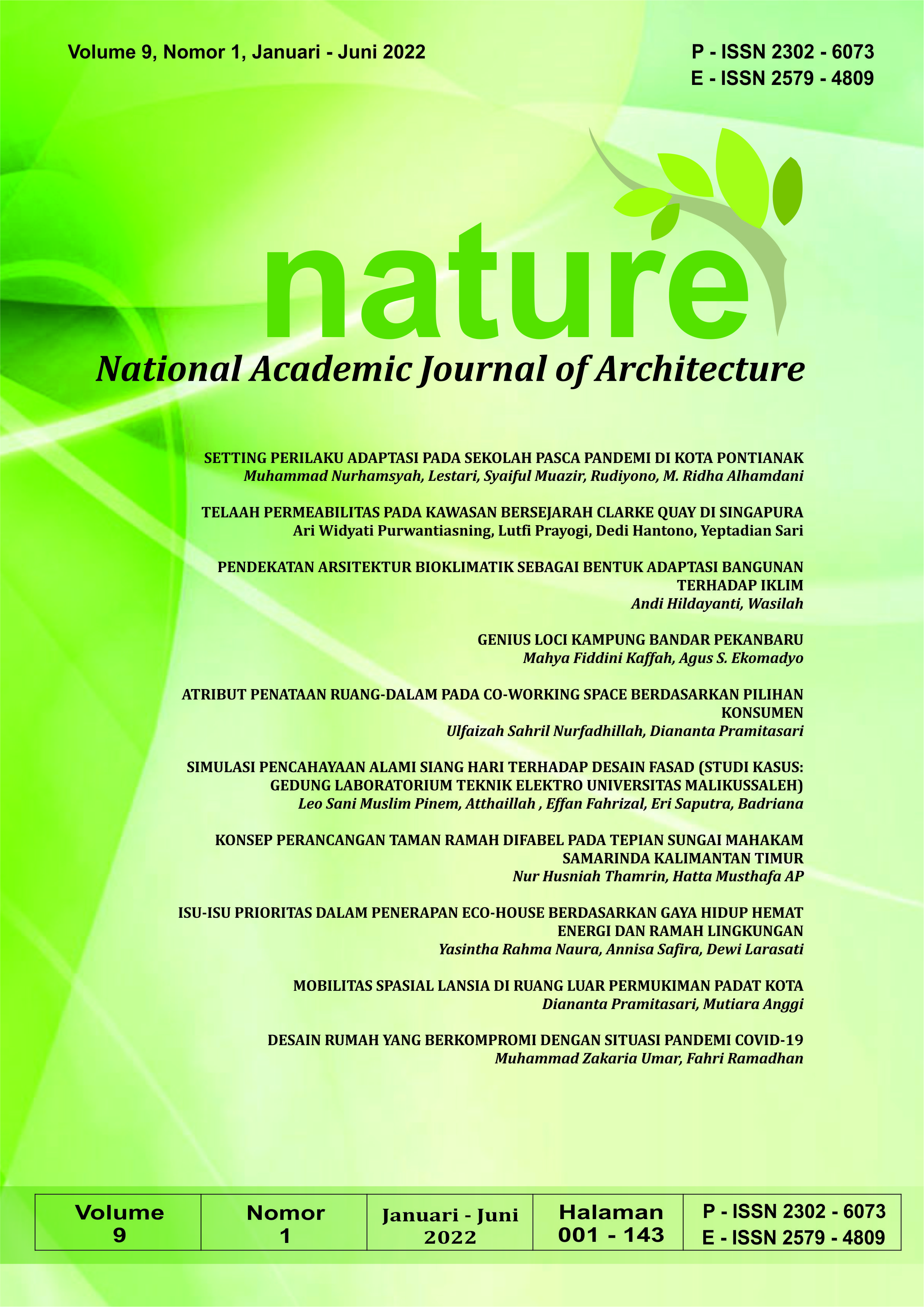GENIUS LOCI KAMPUNG BANDAR PEKANBARU
Abstract
Abstract_ Kampung Bandar is an old town that became the forerunner of the development of Pekanbaru City. Kampung Bandar is located on the banks of Siak River, a river that is a source of life and a place for people to carry out their daily activities. The existence of the Siak River creates a unique socio-cultural atmosphere for the community. The purpose of this study is to reveal the Genius Loci in Kampung Bandar using the Genius Loci approach proposed by Norberg-Schultz within the framework of architectural phenomenology. The method used in the process of collecting data in this study is a qualitative method. Research shows that the Genius Loci of Kampung Bandar are formed by the community's attachment to the Siak River which is manifested in the form of buildings, traditions, and community activities in daily life.
Keywords: Architecture; Genius Loci; Kampung Bandar.
Downloads
References
Agumsari, D., Ekomadyo, A.S., Bintana, M.G.D., Susanto, V. (2020). Capturing Genius Loci of Riparian Culture: The Case of Musi River Palembang. Proceedings of the 3rd International Conference on Dwelling Form (IDWELL 2020). Advances in Social Science, Education and Humanities Research, vol. 475. https://doi.org/10.2991/assehr.k.201009.011
Asy Syahid, M. A. (2021). Imajinasi Nusantara: Budaya Lokal dan Pengetahuan Tradisional dalam Masyarakat Indonesia Kontemporer. Pusat Studi Islam dan Kenegaraan (PSIK) Indonesia.
Creswell, J. W. (2014). Qualitative, Quantitative, and Mixed Methods Approach. United States of America.Ekomadyo, A.S., Zahra, A., dan Najmi, I. (2012) Public Market as Urban Social Nodes: an Architectural Phenomenology Approach.
Ekomadyo, A. S. (2012). “Menelusuri Genius Loci Pasar Tradisional sebagai Ruang Sosial Urban di Nusantara.” Semesta Arsitektur Nusantara.
Firzal, Y., & Faisal, G. (2018). “Architecture And Socio-Cultural Life: Redefining Malay Settlement on the east coast of Sumatera.”
Ghalib, W. (1980). Sejarah Kota Pekanbaru. Pekanbaru: Pemda Kodya Pekanbaru.
Habibullah, S. & Ekomadyo, A.S. (2021). “Place-Making pada Ruang Publik: Menelusuri Genius Loci pada Alun-Alun Kapuas Pontianak.” Jurnal Pengembangan Kota Volume 9 No. 1 (36–49), DOI: 10.14710/jpk.9.1.36-49
Hanifati, K., & Harjoko, T. Y. (2020). Arsitektur sebagai Fenomena Kehadiran Manusia. Prosiding (SIAR) Seminar Ilmiah Arsitektur 2020.
Kecamatan Senapelan dalam Angka. (2021). BPS Kota PekanbaruMoran, D. (2000). Introduction to phenomenology. London: Routledge.
Norberg-Schultz, C. (1980). Genius Loci: Towards a Phenomenology of Architecture, London: Academy Editions London.
Pemko_Pekanbaru. (2020). Mengenal Kota Pekanbaru [Online]. Available at: http://pekanbaru.go.id/sejarah-pekanbaru/ (Accessed: 03 December 2021; 09.33 AM). Penataran Ruang Daerah Aliran Sungai (DAS) Siak Provinsi Riau. (2005). Paparan Menteri Pekerjaan Umum.
Punuh, C. S. (2014). “Genius Loci Kampung Los Di Kelurahan Malalayang I Timur Manado.” Sabua: Jurnal Lingkungan Binaan dan Arsitektur, 6(2), 261-267.
Savitri, R., & Ekomadyo, A. S. (2021). “Genius Loci Permukiman Bansir Laut di Kota Pontianak.” Jurnal TIARSIE, 18(1), 1-10.Silva, H. (2015). Identifikasi Arsitektur Melayu Di Kota Pekanbaru. Jurnal Arsitektur: Arsitektur Melayu dan Lingkungan, 2(1).
Soltani, S., & Kirci, N. (2019). “Phenomenology and Space in Architecture: Experience, Sensation and Meaning.”
Siregar, H.H., Natalivan, P., Ekomadyo, A.S. (2017). “Cultural Assemblage as Genius Loci: Character Analysis of Medan City Center District.” https://doi.org/10.1051/shsconf/20184104011
Sundari, T., Cheris, R., & Repi, R. (2018). “Kajian Potensi Bandar Senapelan Sebagai Kawasan Wisata Sejarah Dan Budaya Di Pekanbaru.“ Prodi Arsitektur Fakultas Teknik Universitas Lancang Kuning Pekanbaru.
Suroyo, M. B., & Ibrahim, B. (2021). “The Development of Senapelan City as a Historical Tourism on Spice Road.” Santhet:(Jurnal Sejarah, Pendidikan, Dan Humaniora), 5(2), 147-155.Van Manen, M. (2017). Phenomenology and meaning attribution. Indo-Pacific Journal of Phenomenology, 17:1, 1-12, DOI: 10.1080/20797222.2017.1368253
Copyright (c) 2022 Mahya Fiddini Kaffah, Agus S. Ekomadyo

This work is licensed under a Creative Commons Attribution-ShareAlike 4.0 International License.
By submitting your manuscript to our journal, you are following Copyright and License











